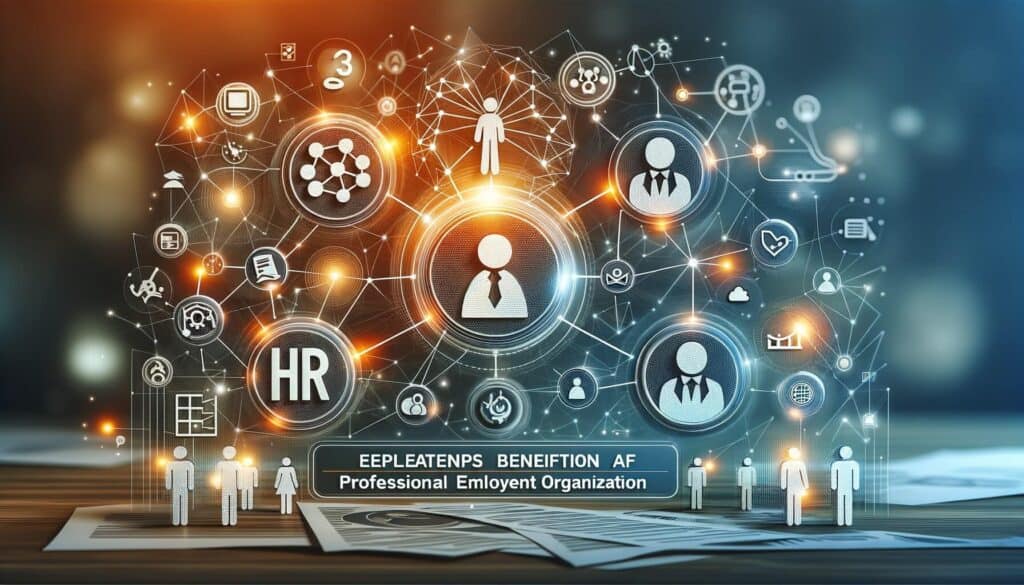
By Amanda Hoglund January 11, 2025
In today’s complex business landscape, companies face numerous challenges when it comes to managing their workforce effectively. From HR management and compliance to payroll administration and employee benefits, the demands can be overwhelming for businesses of all sizes.
This is where Professional Employer Organizations (PEOs) come into play. A PEO is a strategic partner that provides comprehensive HR solutions to businesses, allowing them to focus on their core competencies while leaving the complexities of HR management to the experts.
Understanding the Role and Functions of a PEO

At its core, a PEO acts as a co-employer, sharing certain employer responsibilities with the client company. This unique relationship allows the PEO (Professional Employer Organization) to assume various HR functions, such as payroll processing, tax administration, employee benefits management, risk management, and even recruitment. By partnering with a PEO, businesses can tap into a wealth of expertise and resources, enabling them to streamline their HR processes and improve overall efficiency.
One of the key functions of a PEO is to handle payroll processing and tax administration. This includes tasks such as calculating and distributing employee wages, managing payroll taxes, and ensuring compliance with local, state, and federal regulations. By outsourcing these critical functions to a PEO (Professional Employer Organization), businesses can save time and resources, reduce the risk of errors, and ensure compliance with ever-changing tax laws.
Benefits of Partnering with a PEO (Professional Employer Organization) for Businesses

Partnering with a PEO (Professional Employer Organization) offers numerous benefits for businesses. Firstly, it allows companies to access a wide range of HR services and expertise that may not be available in-house. This includes access to HR professionals who can provide guidance on compliance issues, employee relations, and performance management. Additionally, PEOs often have access to advanced HR technology platforms, which can streamline processes and improve overall efficiency.
Another significant advantage of working with a PEO (Professional Employer Organization) is cost savings. By outsourcing HR functions to a PEO, businesses can reduce the need for in-house HR staff, saving on salaries, benefits, and training costs. Moreover, PEOs often have the buying power to negotiate better rates for employee benefits, such as health insurance and retirement plans, resulting in potential cost savings for the client company.
PEOs (Professional Employer Organizations) also help businesses mitigate risk and ensure compliance with various employment laws and regulations. With ever-changing labor laws and regulations, it can be challenging for businesses to stay up-to-date and avoid costly penalties. PEOs have a deep understanding of these laws and can provide guidance and support to ensure compliance, reducing the risk of legal issues and potential lawsuits.
How PEOs Help with HR Management and Compliance

HR management is a critical aspect of running a successful business. However, it can be time-consuming and complex, especially for small and medium-sized enterprises (SMEs) that may not have dedicated HR departments. This is where PEOs can make a significant impact. By partnering with a PEO (Professional Employer Organization), businesses can offload many HR functions, allowing them to focus on their core business objectives.
PEOs can assist with various HR management tasks, such as employee onboarding and offboarding, performance management, and employee relations. They can also provide guidance on HR policies and procedures, ensuring consistency and compliance across the organization. Additionally, PEOs often have access to advanced HR technology platforms, which can automate and streamline HR processes, saving time and improving accuracy.
Compliance with employment laws and regulations is another area where PEOs excel. They stay up-to-date with the latest changes in labor laws and can provide guidance on issues such as wage and hour regulations, anti-discrimination laws, and employee classification. By partnering with a PEO (Professional Employer Organization), businesses can ensure that their HR practices are in line with legal requirements, reducing the risk of costly penalties and lawsuits.
Exploring PEO (Professional Employer Organization) Services: Payroll and Tax Administration
Payroll processing and tax administration are critical functions for any business, regardless of size. However, they can be time-consuming and complex, requiring a deep understanding of tax laws and regulations. This is where PEOs can provide significant value. By outsourcing payroll and tax administration to a PEO (Professional Employer Organization), businesses can save time, reduce the risk of errors, and ensure compliance with tax laws.
PEOs handle various aspects of payroll processing, including calculating and distributing employee wages, managing deductions and withholdings, and generating payroll reports. They also handle tasks such as issuing year-end tax forms, such as W-2s, and ensuring compliance with tax filing deadlines. By entrusting these functions to a PEO (Professional Employer Organization), businesses can focus on their core operations, knowing that their payroll is being handled accurately and efficiently.
Tax administration is another area where PEOs excel. They stay up-to-date with the latest tax laws and regulations, ensuring that businesses remain compliant. PEOs can handle tasks such as calculating and remitting payroll taxes, filing tax returns, and responding to tax-related inquiries from government agencies. By outsourcing tax administration to a PEO (Professional Employer Organization), businesses can reduce the risk of costly penalties and audits, allowing them to focus on their core business objectives.
PEOs and Employee Benefits: Health Insurance, Retirement Plans, and More
Employee benefits play a crucial role in attracting and retaining top talent. However, managing employee benefits can be complex and time-consuming, especially for businesses that may not have the resources or expertise to navigate the intricacies of the benefits landscape. This is where PEOs can provide significant value. By partnering with a PEO, businesses can access a wide range of employee benefits, including health insurance, retirement plans, and more.
One of the key advantages of working with a PEO (Professional Employer Organization) is access to affordable health insurance options. PEOs often have the buying power to negotiate better rates with insurance providers, allowing businesses to offer competitive health insurance plans to their employees. This can be particularly beneficial for small businesses that may not have the bargaining power to secure favorable rates on their own.
Retirement plans are another area where PEOs can assist businesses. PEOs can offer retirement plan options, such as 401(k) plans, to employees, allowing them to save for their future. By partnering with a PEO (Professional Employer Organization), businesses can provide their employees with access to retirement benefits typically only available to larger organizations. This can help attract and retain top talent, as employees value the opportunity to save for their retirement.
In addition to health insurance and retirement plans, PEOs can also offer other employee benefits, such as dental and vision insurance, life insurance, and disability insurance. By partnering with a PEO (Professional Employer Organization), businesses can provide a comprehensive benefits package to their employees, enhancing their overall compensation package and improving employee satisfaction and retention.
PEOs and Risk Management: Workers’ Compensation and Safety Programs
Risk management is a critical aspect of running a business. From workers’ compensation claims to workplace safety, businesses must take proactive measures to mitigate risks and ensure the well-being of their employees. This is where PEOs can provide significant value. By partnering with a PEO (Professional Employer Organization), businesses can access expertise and resources to effectively manage risk and create a safe work environment.
Workers’ compensation is a key area where PEOs can assist businesses. PEOs often have access to competitive workers’ compensation insurance rates, allowing businesses to secure coverage at a more affordable cost. Additionally, PEOs can handle workers’ compensation claims management, including reporting and processing claims, coordinating medical treatment, and facilitating return-to-work programs. By outsourcing workers’ compensation to a PEO (Professional Employer Organization), businesses can reduce the administrative burden and ensure compliance with workers’ compensation laws.
Workplace safety is another area where PEOs excel. They can provide guidance on developing and implementing safety programs, conducting risk assessments, and ensuring compliance with Occupational Safety and Health Administration (OSHA) regulations. PEOs can also offer training programs to educate employees on safety practices and procedures, reducing the risk of workplace accidents and injuries. By partnering with a PEO (Professional Employer Organization), businesses can create a culture of safety and minimize the potential for costly accidents and lawsuits.
PEOs and Recruitment: Finding and Retaining Top Talent
Recruiting and retaining top talent is a key priority for businesses looking to stay competitive in today’s labor market. However, the recruitment process can be time-consuming and resource-intensive, especially for businesses that may not have dedicated HR departments. This is where PEOs can provide significant value. By partnering with a PEO (Professional Employer Organization), businesses can access expertise and resources to attract, hire, and retain top talent.
PEOs can assist with various aspects of the recruitment process, from job posting and candidate screening to conducting interviews and background checks. They can also provide guidance on developing effective job descriptions, creating competitive compensation packages, and implementing employee referral programs. By leveraging the expertise of a PEO (Professional Employer Organization), businesses can streamline their recruitment process and increase the likelihood of finding qualified candidates.
Once employees are hired, PEOs can also assist with onboarding and orientation, ensuring that new hires have a smooth transition into the organization. This includes tasks such as completing necessary paperwork, conducting orientation sessions, and providing training on company policies and procedures. By partnering with a PEO (Professional Employer Organization), businesses can create a positive onboarding experience, setting the stage for long-term employee engagement and retention.
Frequently Asked Questions about PEOs
Q1. What is a PEO (Professional Employer Organization)?
A Professional Employer Organization (PEO) is a strategic partner that provides comprehensive HR solutions to businesses, allowing them to outsource various HR functions and focus on their core competencies.
Q2. What services do PEOs offer?
PEOs (Professional Employer Organizations) offer a wide range of services, including payroll processing, tax administration, employee benefits management, risk management, and recruitment support.
Q3. How can partnering with a PEO benefit my business?
Partnering with a PEO (Professional Employer Organization) can benefit your business in several ways, including access to HR expertise and resources, cost savings, risk mitigation, and improved efficiency.
Q4. Can PEOs help with compliance?
Yes, PEOs can help businesses ensure compliance with various employment laws and regulations, reducing the risk of legal issues and penalties.
Q5. How do PEOs handle payroll and tax administration?
PEOs handle tasks such as calculating and distributing employee wages, managing payroll taxes, and ensuring compliance with tax laws and regulations.
Q6. Can PEOs help with employee benefits?
Yes, PEOs (Professional Employer Organizations) can offer a wide range of employee benefits, including health insurance, retirement plans, and more. They often have the buying power to negotiate better rates with insurance providers, resulting in potential cost savings for businesses.
Q7. How do PEOs assist with risk management?
PEOs can assist with risk management by providing access to competitive workers’ compensation insurance rates, handling workers’ compensation claims management, and offering guidance on workplace safety programs.
Q8. Can PEOs help with recruitment?
Yes, PEOs can assist with various aspects of the recruitment process, including job posting, candidate screening, and conducting interviews. They can also provide guidance on developing effective job descriptions and creating competitive compensation packages.
Q9. How do PEOs ensure a smooth onboarding process?
PEOs can assist with onboarding and orientation, ensuring that new hires have a smooth transition into the organization. This includes completing necessary paperwork, conducting orientation sessions, and providing training on company policies and procedures.
Q10. How do I choose the right PEO for my business?
When choosing a PEO (Professional Employer Organization), it’s important to consider factors such as industry expertise, service offerings, technology platforms, and customer reviews. It’s also recommended to request proposals and conduct interviews with potential PEO (Professional Employer Organization) partners to ensure a good fit for your business.
Conclusion
In today’s complex business environment, managing HR functions can be overwhelming for businesses of all sizes. This is where Professional Employer Organizations (PEOs) come into play. By partnering with a PEO, businesses can access a wide range of HR services and expertise, allowing them to streamline their HR processes, reduce costs, ensure compliance, and attract and retain top talent.
From payroll processing and tax administration to employee benefits management and risk mitigation, PEOs offer comprehensive solutions that can help businesses focus on their core competencies and achieve their strategic objectives. By outsourcing HR functions to a PEO, businesses can tap into a wealth of resources and expertise, enabling them to navigate the complexities of HR management with ease.
In conclusion, partnering with a PEO can be a game-changer for businesses looking to optimize their HR operations and drive long-term success. By leveraging the expertise and resources of a PEO, businesses can enhance their HR capabilities, improve efficiency, and create a positive work environment that attracts and retains top talent. Whether it’s payroll processing, tax administration, employee benefits, risk management, or recruitment support, a PEO can provide the necessary tools and guidance to help businesses thrive in today’s competitive landscape.